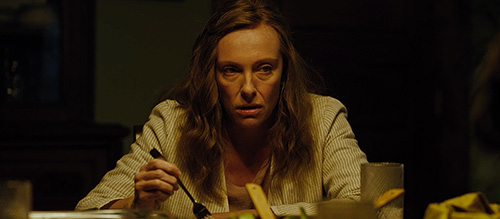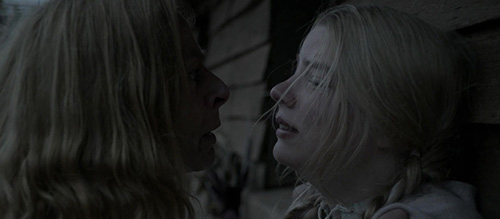A24 Horror: Success, Religion and Difference in Modern American Cinema
Independent films are very quickly becoming a popular fragment of the American film industry, with the horror genre impacting dramatically on audiences. Independent horror films usually have a niche palate and attract a particular viewer, often resulting in them having a cult-like following. Independent film distributor A24 has released a variety of horror films in the last few years, such as The Witch (2015) and Hereditary (2018), and have used this cult-like enthusiasm to create a unique following of fans.
Founded in 2012, A24 has not been building its brand for long, yet it has already seen success in abundance. This has not always been financially, but their films have certainly connected with audiences and critics alike. Before 2017’s Lady Bird became a $49 million US box office triumph, A24’s biggest hit was Moonlight (2016) which collected around $28 million at the US box office, making it one of the lowest-grossing films ever to win Best Picture at the Oscars. Consequently, A24 almost doubled its grossing numbers in the US in just a year.
It would be fair to suggest that A24 is continuing to uphold the vision that independent films currently have; they are distinctive from Hollywood and are attractively labelled as ‘niche’ or ‘creative’. Indie films historically deal with real issues and tend to rebel aesthetically, thematically and ideologically from typical mainstream cinema. The topics approached in A24’s films, particularly within their horror films, resonate with this idea, as they are often taboo, uncomfortable and exaggerated, yet A24 does not sacrifice the narrative or nature of its films for more profit. Hereditary in particular has suggested that a new wave of horror is emerging with its dysfunctional family narrative, gruesome and uncomfortable scenes, and distressing undertones. A24 continues to play on its viewers’ need for horror and scares. It is routine for an individual to be so mindful of oneself, and the reality of our position in the world is often overlooked. A24 and its horror films envision this reality for the viewer and make them contemplate their fragility. The simulation of on-screen death, pain or torture only encourages this intense feeling; making the viewer feel vulnerable yet incredibly omnipotent.
Going back to the previous point regarding Hereditary’s dysfunctional family narrative, it is important to note that this is an example of how the film tackles difference. The film contains the typical layout for a middle-class American family, yet the characters seem like strangers to one another in how they present themselves. It is often mentioned that the recently deceased grandmother was a difficult woman and that her mental health issues had an impact on the rest of the family. The difference in this case, is the grandmother. It is clear to see in Hereditary that the characters consume those around them, particularly the mother, who is the most emotional of all the family members and ends up being the cause of her family’s demise.
Religion also plays a big part in Hereditary’s narrative, yet the cultish nature at its heart makes it secretive and suspicious. The grandmother devoutly worships “Paimon”, a spirit and a King of Hell noted for being devoutly loyal to Lucifer, as well as an extraordinarily powerful being with the ability to control others. This control is apparent in Hereditary and closely harmonises with societal views on religion; as well as with those who follow a religion, follow the words and prayer of their God or deity. Sadly, in recent times, it has been shown that a minority of people have turned to extreme terrorism in the name of their religion, though their actions do not follow the locution of that religion whatsoever – they are arguably controlled by evil and aim to harm those who defy them, and employ those who are vulnerable or impressionable. In Hereditary, Paimon preys on the vulnerability of both children, Charlie and Peter, and attempts to possess them spiritually. Slowly, their views begin to change about the world, their family and themselves, all at the influence of Paimon. This is almost identical to recent news about young people being influenced by religious extremists and can also be connected to the everyday impact of peer pressure on young people. This is a clear illustration of how A24 is attempting to approach uncomfortable topics by turning them into horror stories.
This theme of religion is also apparent in The Witch, with the focus being on a family of New England settlers who are banished from a Puritan colony over a religious dispute. This Christian family were rejected by their colony when they sought a new life, purely for not being a Puritan family. Because of their religion, they were seen as a threat and forced to leave. In this case, they are different. In The Witch, the family’s banishment initiates a series of supernatural occurrences resulting in the family’s demise, a metaphor for the consequences of society’s lack of acceptance towards others.
As well as religion, the societal role of women is a topic that is closely explored in The Witch. The film focuses heavily on motherhood as well as the strong mindset of women. The eldest daughter of the family, Thomasin, has her own beliefs and ideals that she wishes to follow and has been neglectful to the religion that has been thrust upon her since birth. When her parents hear of her disobedience, they silence her and deem her devilish for having such thoughts. Writer and director Robert Eggers clearly manifested society’s thoughts on women throughout this film, showing how Thomasin is constantly muzzled by her parents and ignored by her siblings. This is an example of how A24 have tackled society’s view on women being confident in their own minds and striving to achieve their goals and aspirations.
After the disappearance of her baby and the death of her oldest son, the mother of the family, Katherine, is devastated and grieves, insisting that her “heart has turned to stone”. With talk of witchcraft, she becomes hysterical and confused, until she awakens one night and sees both children together. She begins to breastfeed her baby (who is revealed to be a raven pecking at her bare breast) as she laughs manically. The next morning, her shift is stained with blood. Katherine is depicted as a monstrous feminine as she feeds not her baby but the Devil, and the use of her body reminds us of her maternal figure. This monstrosity is extended when Katherine fights with Thomasin, whom she believes is a witch. With suggestions throughout the film that Katherine holds dominance over the household; “you let Mother be as thy master”, this mother-daughter conflict is a symbol of a fight for power. As Thomasin kills her in self-defence, her mother’s blood on her hands and face, she has taken over and holds the power. With all her family now dead, she is free to openly follow her own desires; in this case, joining a witch’s coven. A24 have offered a sharp portrayal of the conflict that currently resides in society regarding patriarchal views and ideals. Thomasin represents millions of women worldwide who are striving for their voice to be heard and to fight those who silence them.
Historically, an audience’s sole want from any film has always been to feel emotion. Recently, Hollywood’s transition to trusted IPs with built-in audiences has meant that this particular want has felt like it could only be gained from blockbusters and big Hollywood films. But, because of smaller companies like A24, audiences no longer have to seek out this emotion from big, high-budget movies, as there is a growing list of independent film companies producing pictures of a similar or greater quality. As is evident with A24’s horror films, good stories still connect with audiences, no matter the budget. Independent cinema has, therefore, continued to thrive in our constantly changing society, in the face of high budget, massively promoted blockbusters, streaming and all; exploring important subjects and topics through film and art cinema, and manifesting that as emotions for its audiences to indulge in.




